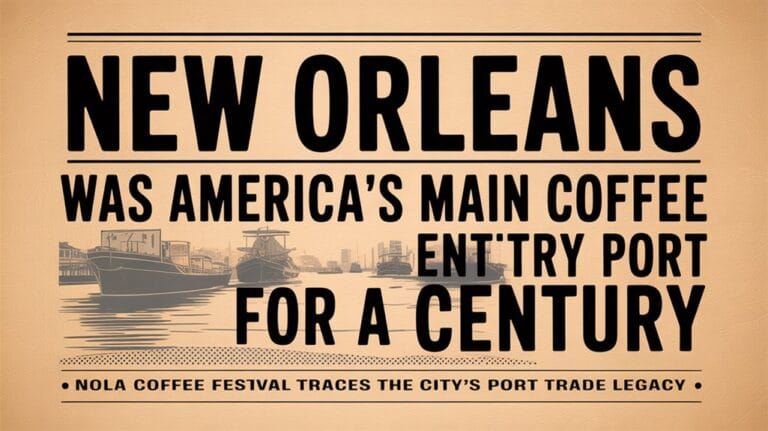How did a Mardi Gras city become a coffee capital? A new festival traces the answer to New Orleans’ economic heritage and long history in port trade. For about a century the city was the main American entry point for coffee. Ships from Central and South America docked at its piers. Importers and warehouses grew around the riverfront. That trade laid a foundation for roasting, distribution, and local brands. The festival traces a 1:1 balance between trade and craft, much like the balanced ratio emphasized in the Cortado drink, where precision preserves intensity 1:1 ratio.
The NOLA Coffee Festival opened in 2023 to showcase that history and the living industry. Organizers set a two-day program. The first day focuses on trade visitors like shop owners, roasters, and buyers. The second day invites the public to sample coffee, attend lectures, and try home brewing classes. The event is at the Ernest N. Morial Convention Center, where halls host vendors and demonstrations. More than a dozen southern roasters bring free samples to highlight regional flavors.
Attendance rose quickly. The festival drew over 2,000 people in its early run, including roasters, baristas, and fans. It aimed to link professionals with the community. Exhibitors included historic importers and new specialty brands. Westfeldt Brothers, a company with a presence in New Orleans for more than 170 years, appears as a key example of continuity in the city’s coffee trade. Major names like Folgers and Community Coffee also have historical ties to the region.
The festival is growing beyond New Orleans. Organizers added events in Jackson, Mississippi, and Lafayette, Louisiana, and plan more in Alabama. They say the move answers a regional need. Coffee events have often centered on the East and West coasts. The NOLA festival wants to give southern roasters a platform. It creates networking chances that weren’t easy to find nearby.
Competitions add energy. Baristas meet in bracket-style contests to show pouring and latte art skills. Workshops give practical skills for industry workers. The festival also highlights the supply chain role New Orleans has played. Speakers and exhibits explain how ships, warehouses, and local businesses shaped the market.
The festival reinforces the city’s role in the national coffee story. It links past port trade to present craft and business. It shows how a city known for parades also shaped an industry.

